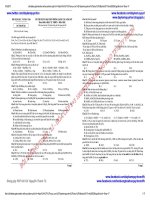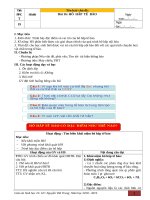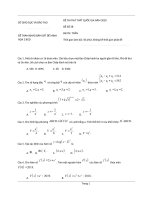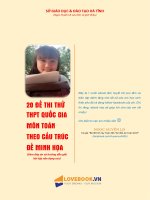1 tiêu chuẩn đề soạn theo cấu trúc minh họa 2021 tiếng anh đề 1
Bạn đang xem bản rút gọn của tài liệu. Xem và tải ngay bản đầy đủ của tài liệu tại đây (97.64 KB, 7 trang )
ĐỀ MẪU THEO FORM ĐỀ MINH HỌA 2021 - BGD
ĐỀ SỐ 1
Mark the letter A, B, C, or D to indicate the word whose underlined part differs from the other three in
pronunciation in each of the following questions.
Question 1. A. looked
B. laughed
C. opened
D. stepped
Question 2. A. seat
B. leave
C. increase
D. ready
Mark the letter A, B, C, or D to indicate the word that differs from the other three in the position of the
primary stress in each of the following questions.
Question 3. A. precede
B. offer
C. visit
D. finish
Question 4. A. charity
B. agency
C. origin
D. disaster
Mark the letter A, B, C or D to indicate the correct answer to each of the following questions.
Question 5. Michael rarely returns to his hometown, _______?
A. doesn’t he
B. hasn’t he
C. does he
D. has he
Question 6. Acupuncture is part of traditional Chinese medicine (TCM) and______ in China for
thousands of years.
A. has been used
B. has using
C. has used
D. has been using
Question 7. My father is interested ________ playing chess with his friends.
A. on
B. with
C. of
D. in
Question 8. _______the time passes, _______I feel! The deadline of my thesis is coming, but I have just
finished half of it.
A. The faster / the nervous
B. The more fast / the nervous
C. The fast / the more nervous
D. The faster / the more nervous
Question 9. I remember she wore a ______dress to go out with her boyfriend last week.
A. cotton white Vietnamese
B. Vietnamese white cotton
C. white Vietnamese cotton
D. white cotton Vietnamese
Question 10. When I last saw him, he ______ in London.
A. has lived
B. is living
C. was living
D. has been living
Question 11. Many exam candidates lose marks simply ________ they do not read the questions
properly.
A. because of
B. because
C. due to
D. owing that
Question 12. The car ______ ready for him by the time he comes tomorrow.
A. will be
B. will have been
C. will being
D. are going to be
Question 13. ________ the homework, he was allowed to go out with his friends.
A. Finishing
B. Finish
C. To finish
D. Having finished
Question 14. John’s ________ and efficiency at the company led to his promotion to Sales Manager.
A. punctuality
B. punctual
C. punctuate
D. punctually
Question 15. The manager is good at ________ difficult customers.
A. relying on
B. dealing with
C. showing off
D. wiping off
Question 16. Nobody took any ________ of the warning and they went swimming in the contaminated
water.
A. regard
B. recognition
C. notice
D. attention
Question 17. Even if you are rich, you should save some money for a ________ day.
A. windy
B. rainy
C. foggy
D. snow
Question 18. It is alleged that mothers and grandmothers spoil the children by______ their mistakes.
A. neglecting
B. overlooking
C. avoiding
D. passing
Question 19. Pesticide residues in fruit and vegetable can be ________ to health.
A. crucial
B. supportive
C. receptive
D. destructive
Mark the letter A, B, C or D to indicate the word(s) CLOSEST in meaning to the underlined word(s) in
each of the following questions.
Question 20. The discovery of the new planet was regarded as a major breakthrough in astronomy.
A. promised
B. doubted
C. considered
D. refused
Question 21. His physical conditions were no impediment to his career as a violinist.
A. help
B. impotence
C. hindrance
D. impossibility
Mark the letter A, B, C or D to indicate the word(s) OPPOSITE in meaning to the underlined word(s)
in each of the following questions.
Question 22. 2008 is a memorable year for people around the world because of the global financial
recession that hit practically every sector of world economy.
A. prosperity
B. downturn
C. crisis
D. depression
Question 23. Jose had a hard time comparing the iPhone to the Samsung phone because to him they were
apples and oranges.
A. containing too many technical details
B. very similar
C. completely different
D. very complicated
Mark the letter A, B, C, or D to indicate the sentence that best completes each of the following
exchanges.
Question 24. A student is asking the librarian to help her to fax a report.
- Student: “Could you help me to fax this report?”
- Librarian: “________”
A. Sorry, I have no idea. B. It’s very kind of you to say so.
C. What rubbish! I don’t think it’s helpful.
D. Certainly, what’s the fax number?
Question 25. David is talking to Linda after a party.
- David: “Would you like me to give you a ride home?”
- Linda: “________”
A. That’s be great, thanks.
B. Sorry, you’re not my type.
C. Yes, I’m riding home now
D. No, thanks. I don’t like riding.
Read the following passage and mark the letter A, B, C, or D to indicate the correct word or phrase
that best fits each the numbered blanks.
The knock-on effect of volunteering on the lives of individuals can be profound. Voluntary work
helps foster independence and imparts the ability to deal with different situations, often simultaneously,
thus teaching people how to (26) ________ their way through different systems. It therefore brings people
into touch with the real world; and, hence, equips them for the future.
Initially, young adults in their late teens might not seem to have the expertise or knowledge to impart
to others that say a teacher or agriculturalist or nurse would have, (27) ________ they do have many skills
that can help others. And in the absence of any particular talent, their energy and enthusiasm can be
harnessed for the benefit of their fellow human beings, and ultimately themselves. From (28)
________this, the gain to any community no matter how many volunteers are involved is (29) ________.
Employers will generally look favorably on people (30) ________ have shown an ability to work as
part of a team. It demonstrates a willingness to learn and an independent spirit, which would be desirable
qualities in any employee.
Question 26. A. give
B. work
C. put
D. take
Question 27. A. so
B. but
C. or
D. for
Question 28. A. all
B. none
C.above
D. both
Question 29. A. unattainable
B. immeasurable
C. undetectable
D. impassible
Question 30. A. which
B. whose
C. who
D. what
Read the following passage and mark the letter A, B, C, or D to indicate the answer to each of the
question.
Some doctors think that you should drink a glass of water each morning. You should drink this water
first thing, before doing anything else. The temperature of the water should be similar to body
temperature; neither too hot nor too cold.
Why should you drink this water? Water helps your body in many ways. It helps clean out your
kidneys. It prepares your stomach for digestion. Water can also help your intestines work better. After
drinking water, the intestines can more easily take out nutrients from our food. Water also helps us go to
the bathroom more easily.
Scientists suggest that people take in 1,600 milliliters of water each day. But don’t drink all of that
water in one sitting. If you do, your kidneys will have to work much harder to eliminate it. It’s better to
drink some in the morning and some in the afternoon. Some people think it’s better to drink between
meals and not during meals. They think water dilutes the juices produced in our stomachs. This can
interfere with normal digestion.
Are you drinking enough water every day? Check the color of your urine. If it is light yellow, you are
probably drinking enough. If your urine is very dark yellow, you probably need to drink more water. A
little more water each day could make you much healthier.
(Adapted from Reading Challenge 1 by Casey Malarcher and Andrea Janzen)
Question 31. What is the main idea of the passage?
A. The importance of water
B. The advice of the doctors
C. How to drink water correctly?
D. The best amount of water to drink
Question 32. According to the passage, water is good for the following organs of the body, EXCEPT
________.
A. kidneys
B. stomach
C. intestines
D. livers
Question 33. The pronoun “it” in paragraph 2 refers to ________.
A. your body
B. your kidney
C. water
D. your stomach
Question 34. The word “eliminate” in paragraph 3 is closest in meaning to ________.
A. preserve
B. remove
C. absorb
D. process
Question 35. Which of the following is NOT true?
A. The first thing you should do every morning is to drink water.
B. You shouldn’t drink too much water at the same time.
C. Drinking water while having meals may interfere with normal digestion.
D. You need to drink more water if your urine is light yellow.
Read the following passage and mark the letter A, B, C, or D to indicate the answer to each of the
question.
Carnegie Hall, the famous concert hall in New York City, has again undergone a restoration. While
this is not the first, it is certainly the most extensive in the building’s history. As a result of this new
restoration, Carnegie Hall once again has the quality of sound that it had when it was first built. Carnegie
Hall owes its existence to Andrew Carnegie, the wealthy owner of a steel company in the late 1800s. The
hall was finished in 1891 and quickly gained a reputation as an excellent performing arts hall where
accomplished musicians gained fame. Despite its reputation, however, the concert hall suffered from
several detrimental renovations over the years. During the Great Depression, when fewer people could
afford to attend performances, the directors sold part of the building to commercial businesses. As a
result, a coffee shop was opened in one corner of the building, for which the builders replaced the brick
and terra cotta walls with windowpanes. A renovation in 1946 seriously damaged the acoustical quality of
the hall when the makers of the film Carnegie Hall cut a gaping hole in the dome of the ceiling to allow
for lights and air vents. The hole was later covered with short curtains and a fake ceiling but the hall never
sounded the same afterwards.
In 1960, the violinist Isaac Stern became involved in restoring the hall after a group of real estate
developers unveiled plans to demolish Carnegie Hall and build a high-rise office building on the site.
This threat spurred Stern to rally public support for Carnegie Hall and encourage the City of New
York to buy the property. The movement was successful, and the concert hall is now owned by the city. In
the current restoration, builders tested each new material for its sound qualities, and they replaced the
hole in the ceiling with a dome. The builders also restored the outer walls to their original appearance and
closed the coffee shop. Carnegie has never sounded better, and its prospects for the future have never
looked more promising.
Question 36. This passage is mainly about ________.
A. changes to Carnegie Hall
B. the appearance of Carnegie Hall
C. Carnegie Hall’s history during the Great Depression
D. damage to the ceiling in Carnegie Hall
Question 37. The word “it” in the first paragraph refers to ________.
A. Carnegie Hall
B. New York City
C. a restoration
D. a plan
Question 38. What major change happened to the hall in 1946?
A. The acoustic dome was damaged.
B. Space in the building was sold to commercial businesses.
C. The walls were damaged in an earthquake.
D. The stage was renovated.
Question 39. Who was Andrew Carnegie?
A. A violinist
B. An architect
C. A steel mill owner
D. Mayor of New York City
Question 40. What was Isaac Stern’s relationship to Carnegie Hall?
A. He made the movie “Carnegie Hall” in 1946.
B. He performed on opening night in 1891.
C. He tried to save the hall, beginning in 1960.
D. He opened a coffee shop in Carnegie Hall during the Depression
Question 41. Which of the following is closest in meaning to the word “detrimental” in paragraph 2?
A. dangerous
B. trivial
C. impressive
D. damaging
Question 42. Which of the following is closest in meaning to the word “unveiled” in paragraph 3?
A. announced
B. restricted
C. overshadowed
D. located
Mark the letter A, B, C or D to indicate the underlined part that needs correction in each of the
following questions.
Question 43. We are going to visit our grandparents when we will finish our final exams.
A. are going to
B. our
C. when
D. will finish
Question 44. A good artist like a good engineer learns as much from their mistakes as from successes.
A. like
B. as
C. their
D. from
Question 45. Many successful film directions are former actors who desire to expand their experience in
the film industry.
A. successful
B. film directions
C. former
D. expand
Mark the letter A, B, C, or D to indicate the sentence that is closest in meaning to each of the following
questions.
Question 46. I haven't met my grandparents for five years.
A. I often met my grandparents five years ago.
B. I last met my grandparents five years ago.
C. I have met my grandparents for five years.
D. I didn't meet my grandparents five years ago.
Question 47. “Would you like to come out to dinner with me tonight, Jenny?” Paul said.
A. Paul suggested that Jenny go out to dinner with him that night.
B. Paul insisted on Jenny going out to dinner with him that night.
C. Paul invited Jenny to go out to dinner with him that night.
D. Pau offered Jenny to go out to dinner with him that night
Question 48. I don’t think Max broke your vase because he wasn’t here then.
A. Max wouldn’t have broken your vase because he wasn’t here then.
B. Max was likely to break your vase because he wasn’t here then.
C. Max can’t have broken your vase because he wasn’t here then.
D. Max wasn’t able to break your vase because he wasn’t here then.
Mark the letter A, B, C, or D to indicate the sentence that best combines each pair of sentences in the
following questions.
Question 49. I deeply regret having spoken to her so severely yesterday. She was badly hurt.
A. If only I could apologize to her for having spoken to her so severely yesterday.
B. I wish I hadn’t spoken to her so severely yesterday.
C. She must have been badly hurt because I had spoken to her so severely yesterday.
D. If I hadn’t spoken to her so severely yesterday, she wouldn’t be badly hurt.
Question 50. The student was very bright. He could solve all the math problems.
A. He was such bright student that he could solve all the math problems.
B. The student was very bright that he could solve all the math problems.
C. He was such bright a student that he could solve all the math problems.
D. So bright was the student that he could solve all the math problems.
THE END
MA TRẬN ĐỀ THI SỐ 1 - MÔN TIẾNG ANH 2021
STT
Dạng bài
1
Phát âm
2
3
Trọng âm
Chọn đáp án
đúng
Chuyên đề
Số câu
NB
TH
- Cách phát âm đuôi -ED
1
x
- Cách phát âm của nguyên âm
1
x
- Trọng âm của từ 2 âm tiết
1
x
- Trọng âm của từ 3 âm tiết
1
- Câu hỏi đuôi
1
x
- Câu bị động
1
x
- Giới từ
1
x
- So sánh kép
1
- Trật tự của tính từ
1
- Thì quá khứ tiếp diễn
1
- Liên từ
1
x
- Sự phối hợp thì (Tương lai & hiện tại)
1
x
- Rút gọn mệnh đề trạng ngữ
1
- Từ loại
1
- Cụm động từ
1
x
- Cụm từ cố định
1
x
- Thành ngữ
1
- Từ vựng
2
x
x
x
x
x
x
x
x
4
Đồng nghĩa
- Từ đơn
2
x
5
Trái nghĩa
- Từ đơn
1
x
- Cụm từ hoặc thành ngữ
1
- Tình huống giao tiếp
2
- Liên từ
1
- Đại từ quan hệ
1
- Từ vựng
2
- Lượng từ
1
x
- Câu hỏi main ideas
2
x
- Câu hỏi EXCEPT/ TRUE/ NOT TRUE
2
x
- Câu hỏi tìm mối liên hệ
2
x
x
- Câu hỏi hồn thành thông tin chi tiêt
2
x
x
- Câu hỏi từ vựng
3
- Câu hỏi suy luận
1
- Thì của động từ
1
- Đại từ nhân xưng
1
6
Giao tiếp
7
Đọc điền từ
8
8
Đọc hiểu
Tìm lỗi sai
VDT VDC
x
x
x
x
x
x
x
x
x
x
x
x
x
x
x
x
x
9
10
Câu đồng
nghĩa
Kết hợp câu
- Từ vựng
1
- Thì của động từ
1
- Câu tường thuật
1
- Động từ khuyết thiếu
1
x
- Câu ước
1
x
- Đảo ngữ
1
x
Tổng
50
x
x
x
15
15
14
6









